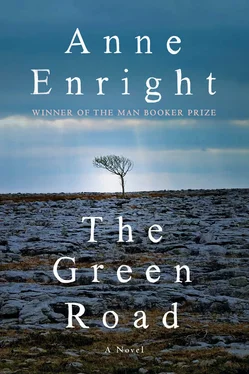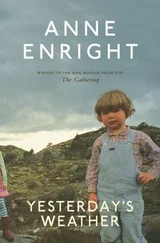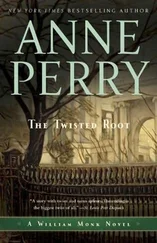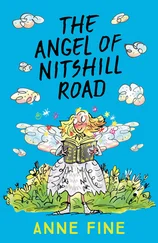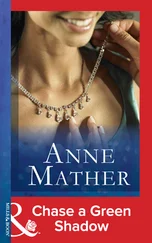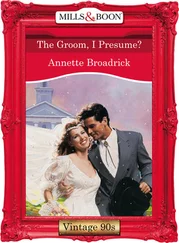Dan was so unhappy. Hanna was only twelve and it was terrible for her to see her brother so pent up — all that belief, and the struggle to make sense of it. When Dan was still at school, he used to make her listen to poems off his English course, and they talked about them afterwards and about all kinds of other things, too. This is what her mother also said, later. She said, ‘I told him things that I told to no one else.’ And this statement was very teasing to Hanna, because there was very little of herself that their mother held back. Her children were never what you might call ‘spared’.
Hanna blamed the Pope. He came to Ireland just after Dan left for college and it was like he flew in specially, because Galway was where the big Youth Mass was held, out on the racecourse at Ballybrit. Hanna went to the Limerick Mass, which was just like standing in a field with your parents for six hours, but her brother Emmet was let go to Galway too, even though he was only fourteen and you were supposed to be sixteen for the Youth Mass. He left in a minibus from the local church. The priest brought a banjo and when Emmet came back he had learned how to smoke. He did not see Dan in the crowd. He saw two people having sex in a sleeping bag, he said, but that was the night before, when they all camped in a field somewhere — he could not tell his parents what was the place.
‘And where was the field?’ said their father.
‘I don’t know,’ said Emmet. He did not mention the sex.
‘Was it a school?’ said their mother.
‘I think so,’ said Emmet.
‘Was it beyond Oranmore?’
They slept in tents, or pretended to sleep, because at four in the morning they all had to pack up and troop through the pitch black to the racecourse. Everyone walked in silence, it was like the end of a war, Emmet said, it was hard to explain — just the sound of feet, the sight of a cigarette glowing at someone’s face before it was whipped away. We were walking into history, the priest said, and when the dawn came, there were men with yellow armbands in their good suits, standing under the trees. That was it, as far as Emmet was concerned. They sang ‘By the Rivers of Babylon’ and he came back with his voice gone and the dirtiest clothes his mother had ever seen; she had to put them through the wash twice.
‘Was it on the road to Athenry?’ their father said. ‘The field?’
The location of the field outside Galway was one abiding mystery in the Madigan family, another was what had happened to Dan, after he went to college. He came back for Christmas and fought with his granny about taking precautions, and his granny was all in favour of taking precautions, that was the joke of it, her sister Constance said, because ‘precautions’ were actually condoms. Later, after the pudding was lit, Dan passed Hanna in the hall and he took took her to him, saying, ‘Save me, Hanna. Save me from these ghastly people.’ He folded her in his arms.
On New Year’s Day a priest called to the house and Hanna saw him sitting in the front room with both her parents. The priest’s hair had the mark of the comb in it, as though it was still wet, and his coat, hanging under the stairs, was very black and soft.
After this, Dan went back to Galway and nothing happened until the Easter break, when he said he wanted to be a priest. He made the big announcement at Sunday dinner, which the Madigans always did with a tablecloth and proper napkins, no matter what. On that Sunday, which was Palm Sunday, they had bacon and cabbage with white sauce and carrots — green, white and orange, like the Irish flag. There was a little glass of parsley sitting on the tablecloth, and the shadow of the water trembled in the sunshine. Their father folded his large hands and said grace, after which there was silence. Apart from the general sound of chewing, that is, and their father clearing his throat, as he tended to do, every minute or so.
‘Hchm-hchmm.’
The parents sat at either end of the table, the children along the sides. Girls facing the window, boys facing the room: Constance-and-Hanna, Emmet-and-Dan.
There was a fire in the grate and the sun also shone, now and then, so they were as warm as winter and warm as summer for five minutes at a time. They were twice as warm.
Dan said, ‘I have been speaking again with Father Fawl.’
It was nearly April. A dappled kind of day. The clean light caught the drops on the windowpane in all their multiplicity while, outside, a thousand baby leaves unfurled against branches black with rain.
Inside, their mother had a tissue trapped in the palm of her hand. She lifted it against her forehead.
‘Oh, no,’ she said, turning away, and her mouth sagged open so you could see the carrots.
‘He says I must ask you to think again. That it is hard for a man who does not have his family behind him. It is a big decision I am making, and he says I must ask you — I must plead with you — not to spoil it, with your own feelings and concerns.’
Dan spoke as though they were in private. Or he spoke as though they were in a great hall. But it was a family meal, which was not the same as either of these things. You could see their mother had an impulse to rise from the table but would not allow herself to flee.
‘He says I am to ask your forgiveness, for the life you had hoped for me, and the grandchildren you will not have.’
Emmet snorted into his dinner. Dan pressed his hands down on to the tabletop before swiping at his little brother, fast and hard. Their mother blanked for the blow, like a horse jumping a ditch, but Emmet ducked and, after a long second, she landed on the other side. Then she put her head down, as though to gather speed. A moan came out of her, small and unformed. The sound of it seemed to please as well as surprise her so she tried again. This next moan started soft and went long, and there was a kind of speaking to its last rise and fall.
‘Oh God,’ she said.
She threw her head back and blinked at the ceiling, once, twice.
‘Oh dear God.’
The tears started to run, one on top of the last, down to her hairline; one, two-three, four. She stayed like that for a moment, while the children watched and pretended not to be watching and her husband cleared his throat into the silence, ‘Hchm-hchmm.’
Their mother lifted her hands and shook them free of their sleeves. She wiped her wet temples with the heels of her hands and used her delicate, crooked fingers to fix the back of her hair, which she always wore in a chignon. Then she sat up again and looked, very carefully, at nothing. She picked up a fork and stuck it into a piece of bacon and she brought it to her mouth, but the touch of meat to her tongue undid her; the fork swung back down towards her plate and the bacon fell. Her lips made that wailing shape — touching in the middle and open at the sides — what Dan called her ‘wide mouth frog’ look, then she took a sharp inhale and went: ‘Aggh-aahh. Aggh-aahh.’
It seemed to Hanna her mother might stop eating or, if she was that hungry, she might take her plate and go into another room in order to cry, but this did not occur to her mother, clearly, and she sat there, eating and crying at the same time.
Much crying, little eating. There was more work with the tissue, which was now in shreds. It was awful. The pain was awful. Her mother juddering and sputtering, with the carrots falling from her mouth in little lumps and piles.
Constance, who was the eldest, bossed them all quietly about and they carried plates and cups past their mother, as she dripped, one way or the other, into her own food.
‘Oh, Mammy,’ said Constance, leaning in, with her arm around her, to slip the plate neatly away.
Dan was the eldest boy, so it was his job to cut the apple tart, which he stood to do, dark against the window light, with the silver triangle of the cake slice in his hand.
Читать дальше
